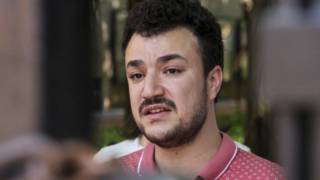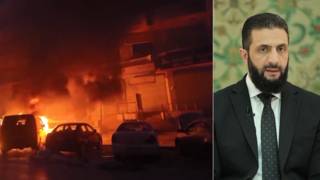HeadlinesOctober 31, 2016
FBI Reopens Investigation into Hillary Clinton Emails, Shaking Up Election
The race for the White House was jolted on Friday when FBI Director James Comey notified congressional leaders that the agency was investigating more emails as part of its probe into Hillary Clinton’s use of a private email system. The emails were discovered as part of a probe into former Congressmember Anthony Weiner, the estranged husband of top Clinton aide Huma Abedin. Abedin reportedly stored hundreds of thousands of emails on Weiner’s computer, which was seized by the FBI after Weiner allegedly sent illicit text messages to a 15-year-old girl. Comey notified Congress before the FBI even obtained a warrant to look at Abedin’s email. A warrant was reportedly issued over the weekend. On the campaign trail, Donald Trump welcomed Comey’s announcement.
Donald Trump: “I have great respect for the fact that the FBI and the Department of Justice are now willing to have the courage to right the horrible mistake that they made. This was a grave miscarriage of justice that the American people fully understood, and it is everybody’s hope that it is about to be corrected. … The news this morning is—this is bigger than Watergate.”
Meanwhile, Hillary Clinton addressed the FBI’s actions during a campaign rally in Daytona Beach.
Hillary Clinton: “It’s pretty strange to put something like that out with such little information right before an election. In fact—in fact, it’s not just strange, it’s unprecedented. And it is deeply troubling, because voters deserve to get full and complete facts. And so, we’ve called on Director Comey to explain everything right away, put it all out on the table, right?”
The criticism of Comey has come from both Democrats and Republicans, who charge Comey may have violated the Hatch Act, which prohibits employees of the executive branch from engaging in political activity. We’ll have more on the FBI’s “October surprise” after headlines, when we’ll be joined by Michael Isikoff, chief investigative correspondent for Yahoo News.
WikiLeaks: Clinton Camp Called Nurses’ Union “Fringe” and “Not Real”
Clinton’s troubles came as WikiLeaks made public more hacked emails from the account of campaign chair John Podesta. In one email, campaign manager Robby Mook urged his staff to attack National Nurses United, which endorsed Senator Bernie Sanders for the Democratic nomination, as “fringe” and “not a real union.” NNU in fact represents 185,000 members and is affiliated with the AFL-CIO. In response, NNU Executive Director RoseAnn DeMoro called the comment “a preview of what we can expect in the next four years and a reminder that—from day one of the Clinton administration—NNU and our allies will need to make our voices loudly heard to advocate for social, economic, and political justice.”
Yemen: U.S.-Backed, Saudi-Led Attack Kills 60
In Yemen, at least 60 people were killed and scores more wounded Saturday when Saudi-led coalition warplanes bombed a security complex near the Red Sea. Many of the dead were prisoners or guards at a prison facility run by Houthi rebels. Witnesses said one airstrike directly targeted the building.
Mohammed Hayel: “We call on the international community, on international organizations, to stop the war on Yemen. This war is not justified. We are struggling to find food, and we have been displaced from our homes. Homes have been demolished over the heads of citizens.”
The U.S. has supplied Saudi Arabia with intelligence, airborne fuel tankers and advanced weaponry, even as Saudi warplanes have bombed Yemeni schools, markets, homes and hospitals, killing hundreds of civilians. The U.N. says a Saudi-imposed blockade has left at least 14 million Yemenis short on food. The World Health Organization is warning of a growing cholera outbreak in Yemen that has killed at least 40 children and sickened more than 1,400 others.
Syrian Rebels Kill Dozens of Civilians in Attack on Western Aleppo
In Syria, rebels unleashed suicide car bomb attacks, rockets and mortars on government-controlled western Aleppo over the weekend, killing at least 41 civilians, including 17 children. Each side accused the other of using poison gas. The U.N. special envoy for Syria called the attacks “relentless and indiscriminate” and said they could amount to war crimes. Residents described a nightmarish assault that left families buried alive.
Wounded man: “My children are still under the rubble! My children are under the rubble! Someone get them out! The building collapsed. Oh, God!”
About 1,500 rebel fighters are massed along Aleppo’s western edge. The counteroffensive is aimed at breaking a government siege of the city’s east, where more than a quarter-million people face severe shortages of water, food, fuel and medicine.
Morocco: Thousands Protest in Echo of Arab Spring Uprising
In Morocco, thousands of protesters flooded cities across the country after a fish seller was crushed to death in a garbage truck trying to retrieve fish confiscated by police. The death of Mouhcine Fikri in the northern town of Al Hoceima on Friday drew widespread anger on social media. Sunday’s rallies were called by activists from the February 20 movement, which organized demonstrations during the Arab unrest of 2011. His death drew parallels to that of a Tunisian fruit seller in 2010 which helped spark the Arab Spring uprisings.
UNICEF Report: 300 Million Children Breathe Highly Toxic Air
The United Nations Children’s Fund is warning that 300 million of the world’s children regularly breathe highly toxic air pollution, putting them at risk of brain damage, lung disease and premature death. UNICEF’s new report, released today, finds most of the highest-risk children live in northern India. It finds the vast majority of the world’s children—some 2 billion people—are exposed to levels of air pollution considered unhealthy by the World Health Organization. Globally, air pollution is responsible for one out of every eight deaths each year, including some 600,000 children under the age of five.
Trials Begin for Two White Officers Who Killed Unarmed Black Men
In the United States, jury selection begins today in two high-profile murder trials of white police officers who killed unarmed black men. In Ohio, former University of Cincinnati police officer Ray Tensing shot and killed 43-year-old Sam DuBose last year after stopping him for not having a front license plate. In North Charleston, South Carolina, officer Michael Slager faces a murder charge after a bystander filmed Slager shooting 50-year-old Walter Scott in the back as he ran away.
Justice Department Shakes Up Investigation of Eric Garner Killing
The trials come as a Justice Department investigation into the choking death of unarmed African American Eric Garner by NYPD officer Daniel Pantaleo is in disarray. The New York Times reported last week that New York-based FBI agents and federal prosecutors are no longer assigned to the investigation. The shakeup leaves prosecutors with the Justice Department’s Civil Rights Division in charge, making it far more likely officers will face criminal charges.
Amnesty International to Observe Policing of Dakota Access Pipeline Resistance
Amnesty International on Friday dispatched human rights observers to the Standing Rock Sioux Reservation in North Dakota, a day after police with military equipment arrested over 140 people and used pepper spray, Tasers, sound cannons, bean bag rounds and rubber bullets against opponents of the proposed Dakota Access pipeline. Native American water protectors who were arrested on Thursday say police wrote numbers on their arms and housed them in what appeared to be dog kennels, without bedding or furniture.
Armed Dakota Access Worker Reportedly Tried to Infiltrate Native Water Protectors
This comes as more details are emerging from Thursday, including video footage of a Dakota Access security contractor holding an assault rifle, with his face covered by a bandana, apparently attempting to infiltrate a group of water protectors. A Standing Rock Sioux tribal member says he saw the man driving down Highway 1806 toward the main resistance camp with an AR-15 rifle on the passenger side of his truck. Protectors chased down his truck and then pursued him on foot in efforts to disarm him. In the video, the contractor can be seen pointing the assault rifle at the protectors as he attempts to flee into the water. He was ultimately arrested by Bureau of Indian Affairs police. Meanwhile, overnight on Saturday, water protectors reported a brush fire began near their main camp. They say they called 911, but no emergency teams responded. Protectors believe the fire was intentionally lit by people working for Dakota Access. We’ll have more on the standoff at Standing Rock later in the broadcast.
Labrador, Canada: First Nations Activists Win Protection from Mercury
In Labrador, Canada, First Nations activists are declaring victory following their occupation of a hydroelectric dam construction site. Members of Labrador’s Inuit and Innu Nations took over the site on October 22, demanding that the company behind the megaproject take steps to prevent the poisoning of traditional food sources like fish and seal with toxic methylmercury. The occupiers won a promise that any decision to flood the area, which could release the mercury, will be subject to scientific review. Meanwhile, a journalist who documented the occupation faces an order to appear in court. Justin Brake, editor of The Independent online newspaper in Newfoundland, followed activists onto the dam site after they cut through a gate. He’s been ordered to appear before a judge by November 10 to face contempt of court charges.
Honduras: Son of Human Rights Leader Assassinated
In Honduras, the son of a prominent human rights leader was shot dead Sunday in what appears to be the latest assassination targeting campesino organizers fighting massive palm oil plantation companies in the valley of Aguán in northern Honduras. Fernando Alemán Banegas was shot several times as he exited a nightclub in the city of La Ceiba. He’s the oldest son of Elsy Banegas president of the Coordinating Committee of Popular Organizations of Aguán. This comes after two campesino leaders in the Aguán region were also assassinated earlier this month.
Iceland’s Pirate Party Poised to Join Government After Election Gains
In Iceland, the Pirate Party made big gains in Sunday’s national elections, raising the prospect it will form a coalition government with other left-wing parties. The Pirates won 10 seats in Iceland’s 63-member Parliament, up from three in the last election. Pirate Party leader Birgitta Jónsdóttir hailed the result.
Birgitta Jónsdóttir: “You know, our internal talk about what to expect has been, you know, we could maybe get somewhere between 12 to 15 (percent), and if we can get 15, we would have tripled our last elections. So we are just thrilled. It’s incredible.”
The Pirate Party hopes to pass the world’s first crowdsourced constitution. Its core platform calls for direct democracy, freedom of expression, civil rights, net neutrality and transparency. The Pirates saw their popularity surge in April, after Iceland’s prime minister resigned following revelations he and his wife used an offshore company to conceal millions of dollars’ worth of investments.
Italian Earthquake Destroys Ancient Buildings But Spares Human Life
In Italy, a powerful 6.6-magnitude earthquake toppled centuries-old churches and crumbled Roman walls but did not cause any deaths. It was Italy’s most powerful quake since 1980. A series of foreshocks earlier in the week forced the evacuation of thousands of at-risk residents, likely saving many lives. Thousands remain homeless, and a leading seismologist warned that more earthquakes could continue along central Italy’s fault system for weeks to come.
Supreme Court Takes Up First-Ever Transgender Rights Case
And the Supreme Court said Friday it will take up its first-ever case on transgender rights, when it considers whether a transgender boy has the right to use the boys’ bathroom at his high school. Seventeen-year-old Gavin Grimm of Virginia is challenging the Gloucester County School Board’s requirement that students use facilities corresponding to their assigned gender at birth. Grimm says the rule left him humiliated and caused him to stop drinking liquids so as not to urinate during the school day. Justices will rule on whether the Obama administration may ban discrimination based on gender identity under Title IX, a law than guarantees equal access to education “on the basis of sex.”
Most popular
- 1
- 2
- 3
- 4
Non-commercial news needs your support
Please do your part today.











Media Options